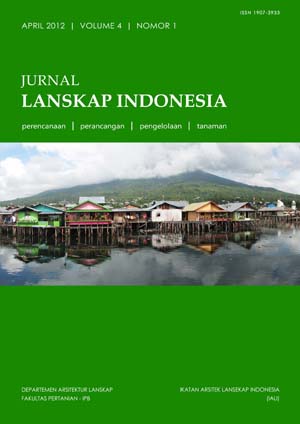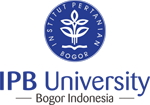COMMUNICATING AND EVALUATING LANDSCAPE DESIGN CONCEPTS ONLINE WITH A VIRTUAL REALITY LANDSCAPE MODEL
Abstract
The communication between designers and users is needed in order to maintain a high level of engagement among the public participants, especially incase study which is considering the environment. The objective of this research is to investigate if
visualization by using Virtual Reality (VR)model is suitable media to communicate landscape design idea from designer to public (users) in case study Situ Leutik Lake. It is answer the question if VRmodel combined with online questionnaire can be a method to gather public participation in landscape design process for case study which is related with public and environments.
The research is started by creating three designalternatives of Situ Leutik Lake in VR model by using Quest 3D. The next step is obtaining public feedback about VR model and selecting the most preferred landscape design alternative. Respondents are asked to investigate three design alternatives by doing walkthrough and bird view in the VR model. After operating VR model, users are asked to fulfill the online questionnaire. In
online questionnaire, respondents are asked if they understand about the idea of each design alternatives. Respondents are also asked to select the most preferred design alternative and give suggestions about final design.
The results show that respondents understand about ideas of each landscape design alternatives and agree that VR model can be media to communicate landscape design idea. The next result is that landscape design alternative number 3 is the most preferred landscape design chosen by respondents. The feedback from respondents about proposed site is supported the statement of Sheppard et al (2008) that visioning by using VR model can affect awareness, emotion and motivation of community to their environment. For site case which involving publics and considering sustainability of environment, the use of VR model is very useful for giving a good understanding to stakeholders about ideas of landscape designer.
Downloads
This journal permits and encourages authors to post items submitted to the journal on personal websites or institutional repositories both prior to and after publication, while providing bibliographic details that credit, if applicable, its publication in this journal. However, after the article is submitted and published in this journal, it is fully copyrighted by the Jurnal Lanskap Indonesia or JLI. If excerpts from other copyrighted works are included, the author must obtain written permission from the copyright owner and give credit to the source in the article. Then, the writer or reader is allowed to copy, share, and redistribute articles/material in any form. But it must still include the appropriate source and credit because the article in this journal is licensed by Creative Commons Attribution 4.0 International License (CC BY 4.0).
I. Proposed Policy for Journals That Offer Open Access
Authors who publish with this journal agree to the following terms:
- Authors retain copyright and grant the journal right of first publication with the work simultaneously licensed under a Creative Commons Attribution License that allows others to share the work with an acknowledgement of the work's authorship and initial publication in this journal.
- Authors are able to enter into separate, additional contractual arrangements for the non-exclusive distribution of the journal's published version of the work (e.g., post it to an institutional repository or publish it in a book), with an acknowledgement of its initial publication in this journal.
- Authors are permitted and encouraged to post their work online (e.g., in institutional repositories or on their website) prior to and during the submission process, as it can lead to productive exchanges, as well as earlier and greater citation of published work (See The Effect of Open Access).
II. Proposed Policy for Journals That Offer Delayed Open Access
Authors who publish with this journal agree to the following terms:
- Authors retain copyright and grant the journal right of first publication, with the work after publication simultaneously licensed under a Creative Commons Attribution License that allows others to share the work with an acknowledgement of the work's authorship and initial publication in this journal.
- Authors are able to enter into separate, additional contractual arrangements for the non-exclusive distribution of the journal's published version of the work (e.g., post it to an institutional repository or publish it in a book), with an acknowledgement of its initial publication in this journal.
- Authors are permitted and encouraged to post their work online (e.g., in institutional repositories or on their website) prior to and during the submission process, as it can lead to productive exchanges, as well as earlier and greater citation of published work (See The Effect of Open Access).



























